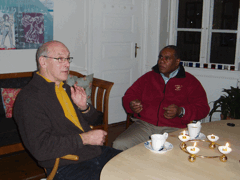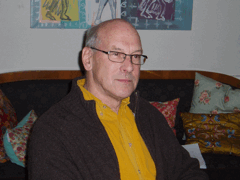Danish Values
Air Date: Week of December 18, 2009

Copenhagen sociologist Peter Gundelach and host Steve Curwood enjoy some Danish hygge. (Photo: Eileen Bolinsky)
It’s cold, it’s dark and it’s one of the happiest places in the world. Steve Curwood asks University of Copenhagen sociologist Peter Gundelach how do the Danes do it? Professor Gundelach says it has to do with finding joy in simple pleasures or as the Danes call it, hygge.
Transcript
CURWOOD: It’s Living on Earth, I’m Steve Curwood at the U.N. Climate Conference in Copenhagen, Denmark.
At this time of year, the city is cold and snowy, and the sun sets at around three in the afternoon. In many places this would be a recipe for gloom and grumpiness, but not here in Denmark. In fact, numerous studies indicate Danes are the happiest people on the planet. Here, like in much of Europe, salaries and the standard of living are high, and violent crime and corruption are low. But, the Danes say it’s not money that buys happiness. They sum up their secret in a difficult to define Danish word:
WOMAN: Hygge is when you turn on – you light the candles. It’s warm, you have some chocolate, you’re with people you love. It’s like you’re just mmm! It’s just mmm! [Laughs]
Yeah, that’s kind of it.
CURWOOD: We tried out a bit of hygge ourselves. We invited University of Copenhagen Sociologist Peter Glindelock to the apartment where we’re staying downtown.
[SOUNDS OF CLINKING CUPS]
CURWOOD: Professor Glindelock has conducted numerous studies on why Danes are so happy. And over a cup of coffee…
GLINDELOCK: It’s called hygge, hygge, which is – Danes like to say it’s not possible to translate that into other languages, but it’s something like coziness – to be in your home, as we’re having our cup of coffee, talking with friends. I think everybody’s doing it actually in the all countries, but the Danes really like to think that it’s something special for them.

Sociology professor Peter Gundelach (Photo: Eileen Bolinsky)
CURWOOD: Denmark scores often at the top of the list of people here being very happy. Americans might look at the Danes being so happy and say, oh, it’s all part of their social system because they have education and health – all that’s taken care of, that’s why they’re so happy. What would you say?
GLINDELOCK: I think that’s probably part of it. The happiness standard is the quality of life in different societies. And Denmark scores very highly on all those different values, so even though the climate is poor, which is part of that analysis it still shows that the welfare state is very important for people’s happiness.
CURWOOD: So, the welfare state is part of the happiness, but not the true secret to Danish happiness because you Danes do better than other similar European countries. So, you can tell us…what is the secret to Danish happiness?
GLINDELOCK: The difference we really found between the Eastern European welfare state was that Danes score much higher on various kinds of social ties. So, they are closer to their family, to their colleagues, to their friends. They meet more often.
And they argue that they have – they have more to do with each other. So, we believe that the character of the social ties is very important. And these social ties are, sort of horizontal. In the sense that it’s on equal terms, and not vertical in relationships.
And a lot of theory says that if social ties are horizontal it creates social trust and also happiness. So, this is – if there is a secret, this is probably it.
CURWOOD: So, how do you characterize this Danish social connectivity?

Copenhagen sociologist Peter Gundelach and host Steve Curwood enjoy some Danish hygge. (Photo: Eileen Bolinsky)
GLINDELOCK: One way of characterizing it is to call it collective individualism in the sense that people like to be something special, but at the same time they like to be very connected.
So, we have this welfare state, the whole system is working in a very collective way. But still people like to be individuals, so if we were to ask people to choose between equality and freedom, they will choose freedom, but still they – it’s such a homogenous society so the way people are expressing their freedom is identical in a sense, but still they like to do both; they like to have a strong collective system and be able to show that they can do something by themselves.
CURWOOD: What problems do you have? In particular, what problems do you have around immigration – people who try to come into this society?
GLINDELOCK: Yes, well, you might say that’s the other side of the coin. I mean, some many say that Denmark is like a tribe, so it’s – everybody knows each other, have the same names, they live in the same neighborhood, so to speak, in a small country. And this means it’s a very close-knit society, but the other side of the coin is that it’s difficult to get access into that society. And in particular, immigrants have had hard times doing that. It’s becoming better now, but for many years it was very a problem.
CURWOOD: It seems to me that taxes are very high here, in Denmark, compared to other places. Now, in America, high taxes – politicians would get voted right out of office, and yet, this society supports them, why?
GLINDELOCK: Having the salary as tax in Denmark, and people are quite happy about it. I mean, whenever you start up a list, and you ask people, would you like taxes to be lower. They won’t say they like to have high taxes, but they prefer high taxes to lower taxes if it means that they can have a well-functioning welfare state.
And in Denmark, everything is sort of state-controlled – the hospitals, the schools, everything is controlled by the local government or the central government – we pay for this in our taxes.
And this kind of welfare state means that everybody gets more or less the same from the state. At least what the Danes like, they like an egalitarian society.
CURWOOD: Peter Glindelock is professor of sociology at the University of Copenhagen. Thank you so much.
GLINDELOCK: Thank you. It was a pleasure.
Links
Professor Peter Gundelach's webpage
Happiness and Life Satiffaction in Advanced European Countries by Peter Gundelach and Svend Kreiner
Living on Earth wants to hear from you!
Living on Earth
62 Calef Highway, Suite 212
Lee, NH 03861
Telephone: 617-287-4121
E-mail: comments@loe.org
Newsletter [Click here]
Donate to Living on Earth!
Living on Earth is an independent media program and relies entirely on contributions from listeners and institutions supporting public service. Please donate now to preserve an independent environmental voice.
NewsletterLiving on Earth offers a weekly delivery of the show's rundown to your mailbox. Sign up for our newsletter today!
 Sailors For The Sea: Be the change you want to sea.
Sailors For The Sea: Be the change you want to sea.
 The Grantham Foundation for the Protection of the Environment: Committed to protecting and improving the health of the global environment.
The Grantham Foundation for the Protection of the Environment: Committed to protecting and improving the health of the global environment.
 Contribute to Living on Earth and receive, as our gift to you, an archival print of one of Mark Seth Lender's extraordinary wildlife photographs. Follow the link to see Mark's current collection of photographs.
Contribute to Living on Earth and receive, as our gift to you, an archival print of one of Mark Seth Lender's extraordinary wildlife photographs. Follow the link to see Mark's current collection of photographs.
 Buy a signed copy of Mark Seth Lender's book Smeagull the Seagull & support Living on Earth
Buy a signed copy of Mark Seth Lender's book Smeagull the Seagull & support Living on Earth

